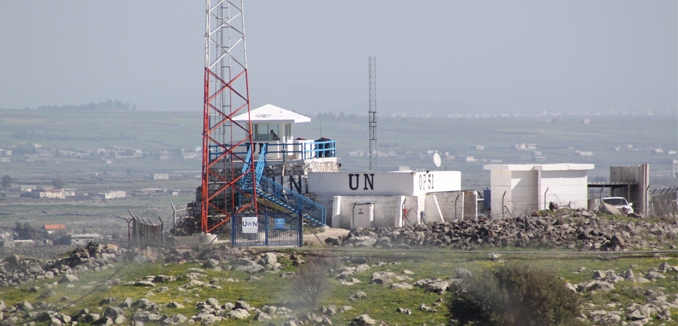Israel’s Ambassador to the United Nations Ron Prosor is stressing the need to enhance security along the Israeli-Syrian border, after three mortars launched from Syria landed deep inside Israeli territory this weekend. In a letter to the U.N. Security Council calling for action, Prosor stressed that Israel would be forced to take unilateral action if the international community was unable to stem the threat that growing chaos inside Syria poses to Israeli citizens:
Israel will not stand by while its citizens’ lives are in danger, Israel’s Ambassador to the UN Ron Prosor warned in an urgent letter to the UN Security Council Monday, following a weekend that saw three mortars fired from Syria land in the southern Golan Heights. “Up until now, Israel has displayed restraint. You must act before things deteriorate,” wrote Prosor, adding that the cross-border fire constituted a violation of the ceasefire agreement between Israel and Syria and had potential to stir up the already restive region.
The mortars landed near Ramat Magshimim in the southern Golan Heights, marking the deepest penetration of Syrian fire into Israeli territory in years. Earlier in the week, a tank shell landed in the central Golan Heights community of Alonei Habashan. The incidents have deepened fears that the conflict raging in Syria – in which an estimated 70,000 people have been killed, and which has already spilled over into Lebanon – will expand into Israel.
Russian U.N. Ambassador Vitaly Churkin, the incumbent president of the Security Council, took the opportunity to note that the armed opposition groups operating near Israel’s border with Syria constituted “a very new and dangerous phenomenon.” Moscow’s diplomatic intentions are tangled. The Kremlin has been backing the Bashar al-Assad regime and has an interest in highlighting the regional dangers posed by the rebel groups seeking the regime’s overthrow.
Nonetheless the dangers to Israel have become increasingly salient. The Syrian conflict has become in large measure a proxy war between Iran and its allies on one side, and Sunni states and the opposition on the other, with Kurdish groups occasionally engaging both groups. Regime forces and their Hezbollah allies have threatened to attack Israel, as have elements from within the opposition. Both have sought to mobilize support in part by blasting Israel.
The dual threats are behind Israel’s “red line” that advanced weapons must not be transferred out of regime hands to non-state actors on either side, either intentionally to Damascus’s Hezbollah allies or unintentionally, as would happen if rebels overran a chemical weapons depot.
[Photo: Stephane Cohen / The Israel Project]




